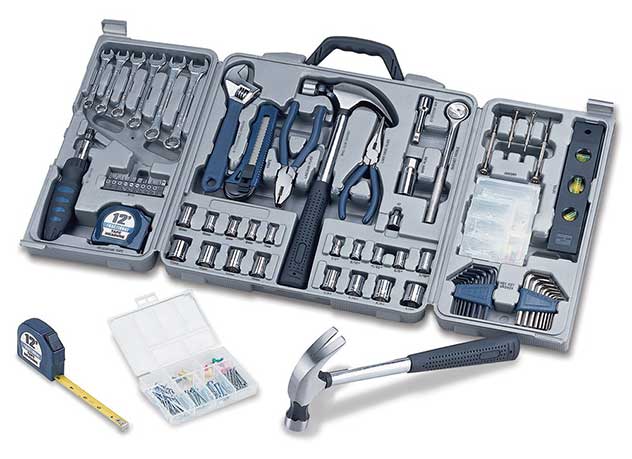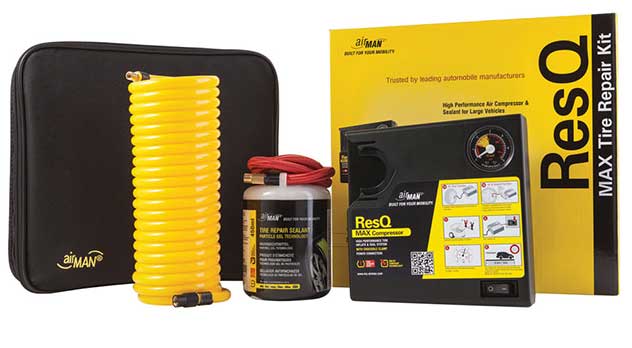While there’s a lot to love about the RV lifestyle, full-timers know to expect the unexpected when they hit the road, which is why many opt for a service like Good Sam Roadside Assistance. But if you’re boondocking in the middle of nowhere when an emergency happens, you’ll need these 21 emergency preparedness essentials for RV owners to get yourself out of trouble.
Here are some basics to help you deal with RV emergencies:
21 Emergency Preparedness Essentials for RV Owners
1. Flares and Warning Triangles

Whether you’re dealing with a tire blowout or any other mechanical issue, we recommend putting out flares (at night) or warning triangles (during the day) when you’re going to be sitting on the side of the road for an extended length of time. It’s the best way to signal your presence to other traffic, so they move over and give you plenty of room to work on your RV.
Shop flares and warning triangles.
2. 101-Piece Tool Kit
A 101-piece tool kit should contain all the basic tools you’ll need to repair most areas of your RV, even if you do not plan on doing heavy repair work. At the minimum, look for a set that includes the most common handy tools such as a socket set, wrenches, pliers, a hammer, screwdrivers, and more.
Shop hand tools and tool kits.
3. Battery Terminal Cleaner
Dirty battery terminal connections can lead to all sorts of problems in your RV. From low voltage at DC outlets to your RV failing to start altogether, a battery terminal cleaner can literally clean up many problems at once.
After a period of time, corrosion builds up around battery terminals if they aren’t properly maintained. This leads to a poor connection, but you can remedy that with a battery terminal cleaner, a little elbow grease, and a reminder to include this into your regular RV maintenance routine.
Shop battery terminal cleaners and protectants.
4. RV Tire Repair Kit
Whether your RV has a full-size spare tire or just a donut, a repair kit with a non-combustible tire sealant should always be part of your RV emergency preparedness kit. Most tire repair kits can repair punctures up to 1/4″ in size and won’t cause rust or corrosion on any type of rim.
Don’t be left with a flat tire. Shop tire repair kits.
5. Portable Air Compressor
A portable air compressor is your best solution for inflating RV tires when you can’t make it to a gas station or another facility with a compressor. There are many designs out there. Some are made for smaller tires, such as those on bikes, carts, and small utility trailer tires.
Others are made for larger tires on your RV, travel trailer, or truck. Most are powered by a 12-volt lighter adapter or a rechargeable battery. Your best case is to have both options to make sure you can power the compressor if you forget to charge its batteries.
Shop air compressors.
6. Tow Straps

Even if you don’t plan on doing any off-roading and your RV isn’t capable of towing another vehicle, having tow straps onboard is a good idea. If you find yourself stuck and a willing bystander has a vehicle that can pull you out safely, tow straps are the essential link between you and your knight in shining armor.
Shop towing accessories.
7. Spare Tire

Most RVs come with them, but that’s not always the case. Plus, you should check whether your coach is equipped with a full-sized spare or just a donut. A donut will get you back on the road in a pinch, but your speed will be limited and you shouldn’t drive very far. Upgrade to a full-sized spare to avoid limping down the highway until you get to the nearest Camping World service center.
Shop tire accessories.
8. Jumper Cables

No matter how diligent you are about turning off lights and RV appliances when you’re done using them, dead batteries happen from time to time. When they do, they shouldn’t stop you from continuing on your journey. And if you have a set of jumper cables handy, you’ll just need a willing campground helper to give you a jump and get you rolling once again.
Shop jump starters and cables.
9. Backup Fuel Canister

This is especially important if you’re taking your RV to more remote boondocking campsites. But it’s always a good idea to have a few extra gallons of fuel stored safely in your RV. You never know when that next gas stop is a little further than you expected. Even if you make it there when you’re running on fumes, knowing you have backup fuel will make those last few miles much less stressful.
Shop portable fuel tanks.
10. Traction Boards

Assembling a proper RV emergency preparedness kit is largely an exercise in embracing self-reliance. So if you want to take the chance on navigating roadways with deep sand, thick mud, or any other less-than-ideal surface, bring a set of traction boards along to help you self-rescue if you start to get stuck.
Shop off-roading and Powersports accessories.
11. Tire Chains

Some of you might winterize your RV and put it in storage during the coldest months of the year, but winter camping has its benefits. Aside from escaping colder regions by seeking snowbird destinations, hitting places like Canyonlands National Park in the winter is a great way to beat the crowds. You’ll just need tire chains stored underneath your RV just to be prepared for inclement weather.
12. Tire Pressure Gauge (or TPMS)

One of the leading causes of tire blowouts is over or under-inflated tires. Checking the pressure in your RV tires regularly is essential to avoid emergencies in the first place. Or, you can install a comprehensive tire pressure monitoring system (TPMS) that easily allows you to monitor tire pressure right from your RV’s captain’s chair. Even with a tire gauge in your kit, consider enrolling in a Good Sam Tire and Wheel Protection plan for auto and RV coverage.
Shop pressure gauges and TPMS models.
13. Fire Extinguisher

An out-of-control fire is quite possibly the scariest thing that could happen to you when adventuring in your RV. While following our tips for fire safety for RV travelers will help you RV safely, you should have an up-to-date fire extinguisher stored somewhere that’s easily accessible in your RV at all times.
Shop fire extinguishers.
14. First Aid Kit

One thing I enjoyed most about camping as a kid was getting my hands dirty…and sometimes my entire body. But the freedom of camping and the adventure of outdoor recreation can come with its fair share of cuts, scrapes, bumps, and bruises. So you’ll need a well-stocked first aid kit on board to patch up these superficial wounds so you can get back to playing as quickly as possible.
Shop first aid kits.
15. Portable Power Station and Generator

Many campers are equipped with multiple batteries to supply power to critical appliances when you aren’t plugged into shore power. However, wall outlets typically require AC power instead of the DC power that those batteries provide. So a portable power station is a great addition to help you keep things like phones, laptops, and tablets charged up so you can stay connected on the road.
Shop portable generators.
16. Compass or Handheld GPS

Smooth navigation is a big part of any successful RV adventure. Whether it’s avoiding roadways with traffic jams, bridges with low clearance, or simply finding out which way is north, having a compass or handheld GPS in your RV is essential. You never know when your knowledge of the cardinal directions will be tested.
Shop compasses and GPS systems.
17. Water Purification System

In the survival world, it’s commonly believed that you can last up to three days without water, compared to up to three weeks without food. Now, we hope you never encounter a survival situation when RVing, but we are talking about emergency preparedness after all. Having a way to purify water from nature can not only save your life but can also extend your camping trips if you head to remote areas and need more water than your motorhome will carry.
Shop water filters and purification systems.
18. Emergency Meals
Most of us like to do some delicious campfire cooking on RV trips. Once again, however, it’s essential to be prepared for the worst if you’re going to expect—and enjoy—the best. So it’s never a bad idea to stock a selection of dehydrated meals or things like Ramen noodles that simply require you to boil water. They might not be what you want to eat on a nightly basis, but they’ll be much-appreciated calories in an emergency.
19. Multi-Tool

From harmless activities to opening a wine bottle to repairing a critical component on your RV awning, having a multi-tool in your RV is essential. These tools usually offer screwdrivers, knives, corkscrews, bottle/can openers, pliers, and an assortment of additional tools that will help you remedy a vast array of emergencies.
Shop multi-tools and other camp tools.
20. Jump Starter

While jumper cables come in handy as long as you have another vehicle around to help you out, a jump starter takes things up another level. It increases your self-reliance by having a way to jump-start your RV without the need for any external help. It’s a great emergency tool for boondockers and full-time RVers that don’t always stay in campgrounds with plenty of other people around.
Shop jump starters.
21. Hand Crank Flashlight

Most flashlights and lanterns run on AA or AAA batteries. Headlamps and flashlights with rechargeable batteries are becoming more and more popular, but they are only good as long as they remain charged. In an emergency, it pays to have a flashlight that can be cranked to provide much-needed light on the situation. When all other power sources fail, you’ll still be able to see to make critical decisions in case of an emergency.
Shop flashlights and lanterns.
A Final Note on RV Emergency Preparedness Essentials
When purchasing emergency tools for your RV, make sure to take your coach’s space and weight limitations into consideration. Overpacking your RV and exceeding its weight ratings is a surefire way to increase your risk of having an emergency in the first place.
Luckily, this list will help you get prepared for any repairs needed while traveling. And if you get in a little over your head, there’s always a local Camping World nearby to help you repair your RV and get back on the road.
Are there any RV emergency preparedness essentials that we didn’t include? Let us know what you never leave home without in the comments below!












